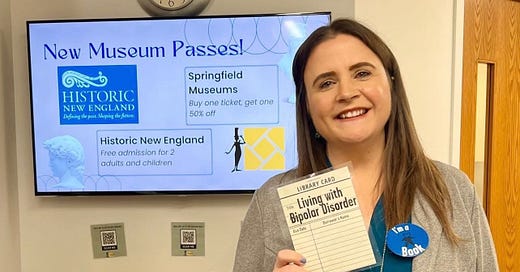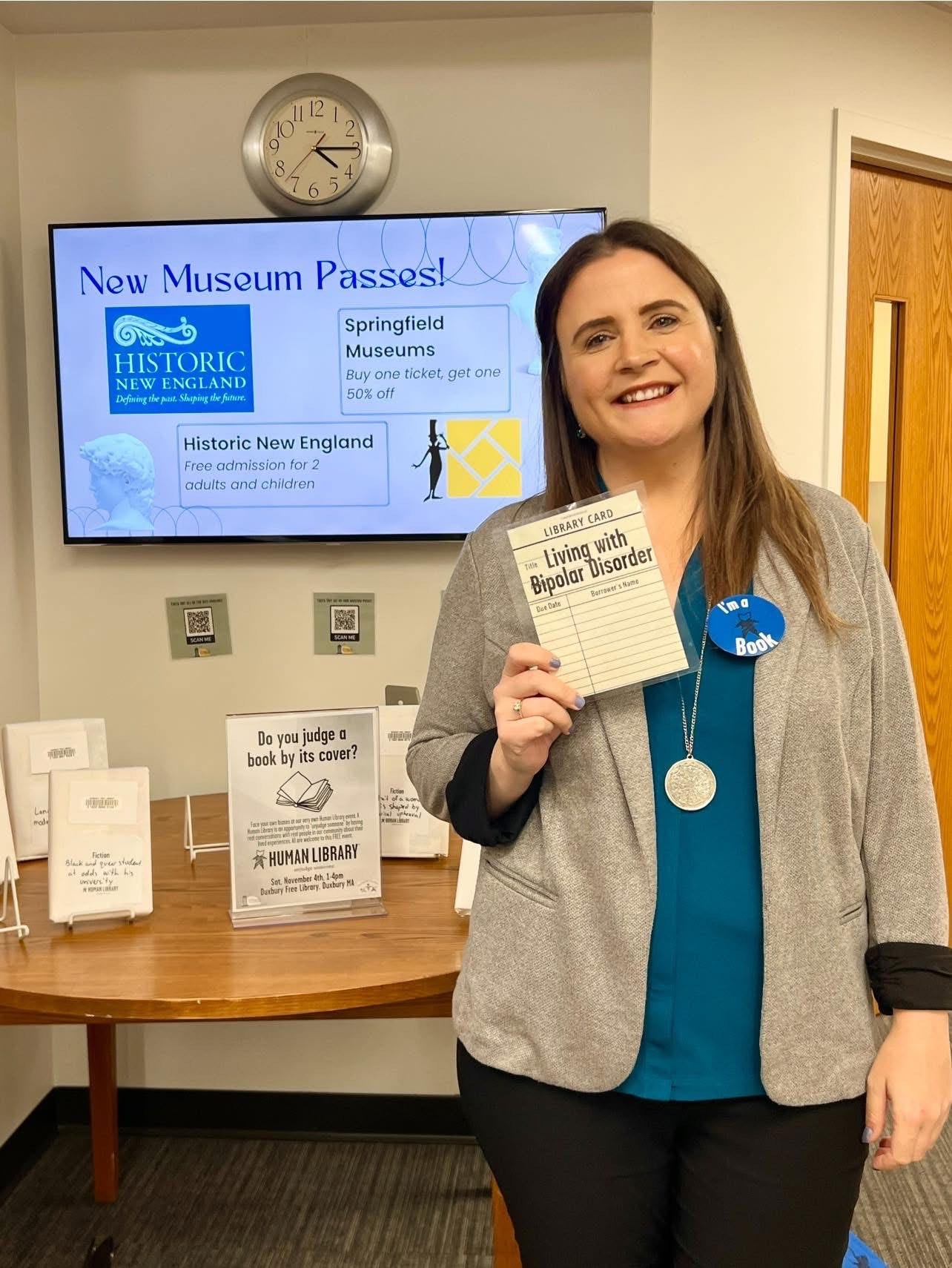Living and Thriving with Bipolar Disorder
I received a lot of great questions as a "book" for The Human Library
As usual, I totally forgot that World Bipolar Day was this week. OPE.
I spoke at an event last weekend called “The Human Library” in Duxbury, Massachusetts, where I was a “book” called Living and Thriving with Bipolar Disorder. Folks from the community could take my book out “on loan,” and approach my table to hear my story and ask questions.
This is my favorite speaking event because it’s so different from others and change often happens when we speak to each other one-on-one. Everyone was lovely to me, usually saying they had a family member or friend with the condition or that they were just unfamiliar with it and wanted to learn more.
The theme was “unjudge someone,” and many people who are often stigmatized in society were featured. I’ve participated in this event for a couple of years and some other “books” were: Postpartum psychosis, rabbi, former prisoner, blind man with autism, borderline personality disorder, Republican, transgender man, nonbinary person, police officer, and Vietnam Veteran.
By the way, any library or community organization can host an event like this. Visit The Human Library website to learn more.
As always, I’m an “open book.” My life can be weird and wonderful, and now I know A LOT about bipolar disorder due to my own experience and my work at a psychiatric hospital. Below, I will share things the library patrons or “readers” asked me and how I answered.
What’s the difference between mania and hypomania?
A couple of extreme examples of mania I’ve encountered:
A person who gambled away $35,000. I asked them if this was over some period of time, and they said 8 hours. They had to file for bankruptcy and expressed a lot of regret about it.
A person who impulsively left their spouse and young child because they were dissatisfied with the marriage. They connected with another person online and met them in-person, quickly becoming convinced that this person was the love of their life. Since this person couldn’t go home and their new partner was from out of state, they lived in a car together outside of a store. This made sense to them at the time, but like the person above, they deeply regretted it later.
Mania is more likely to contribute to some life-ruining stuff and is associated with Bipolar I.
Since I have Bipolar II, I deal with hypomania, a lower level of mania. It affects me in the following ways (by the way, it can be different for everyone, and these things can come with different conditions or life experiences):
I move and complete tasks 4 times faster than usual and get a lot of shit done, which makes me feel very productive
I’m very creative but not very organized about it - sometimes I’ll start a writing piece and won’t finish it, even though it could be finished or adjusted
I clean and/or organize obsessively, thinking I can get everything done in one day, then feel disappointed in myself that I couldn’t do it in that amount of time
I talk faster than usual and it’s difficult to interrupt me because it’s constant - at work, we sometimes have to cut into what someone’s saying during group when it seems it might lead to the person talking for most of or the entire group - it’s almost as if we don’t take time to breathe while talking
I’m super social and excitable
I can become angry, irritable, and argumentative
I am more inclined to spend money
I can make impulsive decisions
The prescription drug lithium helps keep my hypomania symptoms at bay and usually doesn’t have many side effects. You have to get your blood drawn about every 6 months to see if the lithium level is therapeutic and to check on things like your kidneys.
Is it true that cannabis isn’t good for people with bipolar disorder?
Yes, it isn’t good for anyone who deals with a condition that can cause psychosis (like bipolar, schizoaffective, schizophrenia, and otherwise unspecified). Many research studies have shown that cannabis can contribute to psychosis, and one doctor I work with who oversees several studies says it’s often tied to first episode psychosis.
I honestly wish I could still smoke weed. But the last time I smoked weed extensively, it threw me into psychosis and I later had to seek mental healthcare. I’m particularly vulnerable for this. I’m glad it works for others in different ways. Not for me. It’s readily available now which gives folks more access and because of this, people tend to think it’s okay for everyone to use cannabis. I also hear the constant refrain from people that “it’s natural.” That’s fine, it still doesn’t help me, and it’s still not good for people who have experienced psychosis given the extensive research about this.
It’s fairly common at our hospital that someone is released on a set of medications that have been tested with them to see what works. They became stable with us and are warned about using cannabis again. Then, they might be back a week or so later because they started smoking weed again, which can actually lessen the effects of some psychiatric medications, rendering them ineffective. That’s how risky it can be with this population.
What do you have to do to manage bipolar/anxiety and stay in recovery?
I feel like I have to do A LOT, but I’m used to it now. Some folks describe it as feeling like they have a part time job managing their health. Here’s what helps me:
Medication
Therapy
Avoiding substances
Maintaining a good sleep schedule (super important for conditions that can lead to psychosis)
Using coping skills to deal with depression, anxiety, and hypomania
Exercising
Eating healthy, natural food (this can help with cognition)
Journaling about my feelings or answering a prompt - it can help me get out emotions and/or focus on something more positive
Setting boundaries with or avoiding people who aren’t good for my mental health - I had to do this two years ago when people were being emotionally abusive toward me and almost sent me back into another mental health crisis - it’s not worth it to associate with them
Working in an environment that supports my wellness
A lot of planning - there’s so much planning that goes into everything I do as a result of both anxiety and bipolar disorder
Taking notes for everything because it’s difficult for me to remember things
Use my Verilux Happy Lamp each morning to get more “sunlight”
Reality check with my husband regarding if I should worry about something so much, etc.
Avoid the news (too triggering/activating)
Limit time on social media (in the past, I’ve been addicted to it and it led to comparing myself with others too much)
Engage in humor to lighten things up when appropriate, especially because I have to hear difficult things at the hospital during the day, so it’s good to unwind at the end of the day
Keep my space organized and clean - but this sometimes falls by the wayside when I feel depressed
My cousin experiences delusions. How do I disagree with what he’s saying without upsetting him? Should I just go along with what he’s saying?
During my work on an inpatient floor and in outpatient groups focusing on psychosis, I’ve learned that it’s very hard to break down delusions, especially to the point where folks don’t believe in them anymore. Given that people stay 2-4 weeks on average at our hospital, I’m not in a position to help them break down their delusions and I’m also not qualified. That’s best done with an experienced therapist. It can take several months or even years to break down delusions.
However, I learned that I can help in a smaller way. After watching this video and other videos from Dr. Doug Turkington, who specializes in psychosis, I know I can connect to the person’s emotion (Wow, that does sound scary!) without agreeing with them.
For instance, someone I knew experienced delusions as a result of either mania or psychosis and told me they were the smartest person in the world and they knew that for a fact. I knew this person was no Einstein, but they were highly intelligent and valued that quality. So I responded, “You’re very smart. You’ve accomplished a lot as a result of your intelligence.” This was validating for them, but I wasn’t agreeing with them that they were the smartest person in the world. Doing so might be risky, because it could perhaps contribute to someone’s mania.
Dr. Turkington also encourages people to look for the pearl of truth in delusions, because often there is some truth. Look for that and at the right time, try to insert a little doubt.
I once knew a person who was convinced that people had special handheld devices that could see into their house, similar to a device they had at their work. They were very self conscious and fearful while at home. They also thought that law enforcement came to the house over things they did in their home that weren’t crimes. They sometimes saw them outside, but when this person opened the door, the law enforcement officials ran away.
The pearl of truth in these experiences was that this person used to be in trouble with the law years ago. They committed some robberies and law enforcement was after them for a time. But years later, this person settled down, got married, and had kids. They loved their family and I feel they were trying to protect them too. They took a job at a place where similar “scanning” devices were used. Sometimes, law enforcement had to come into their workplace, which might have seemed troublesome given previous experiences.
I said to them, “It seems that if law enforcement were after you, they would have arrested you already. What do you think?”
“I still see them outside my house. I know they’re there,” they said.
“That sounds awful. I can understand why you might be afraid.”
“Thank you. What they’re doing to me is awful,” they said.
“I haven’t heard of this technology yet - the handheld scanning device that could see into your house. It seems like the government would have to go through a lot of hoops to have these things made and given to law enforcement to look into your home without a warrant.”
“Maybe. I don’t know,” they said.
We weren’t close to breaking down any beliefs. They were still steadfast regarding what they experienced. But there was still hope. This person could still meet with a therapist and take a medication that could help.
Those were the most interesting questions I was asked at the Human Library event. If you have questions of your own about these topics, feel free to comment or message me and ask!




You might want to look at the work of Dr. Xavier Amador. His book is titled I'm not sick I don't need help! He runs the LEAP Institute and has a Ted Talk.